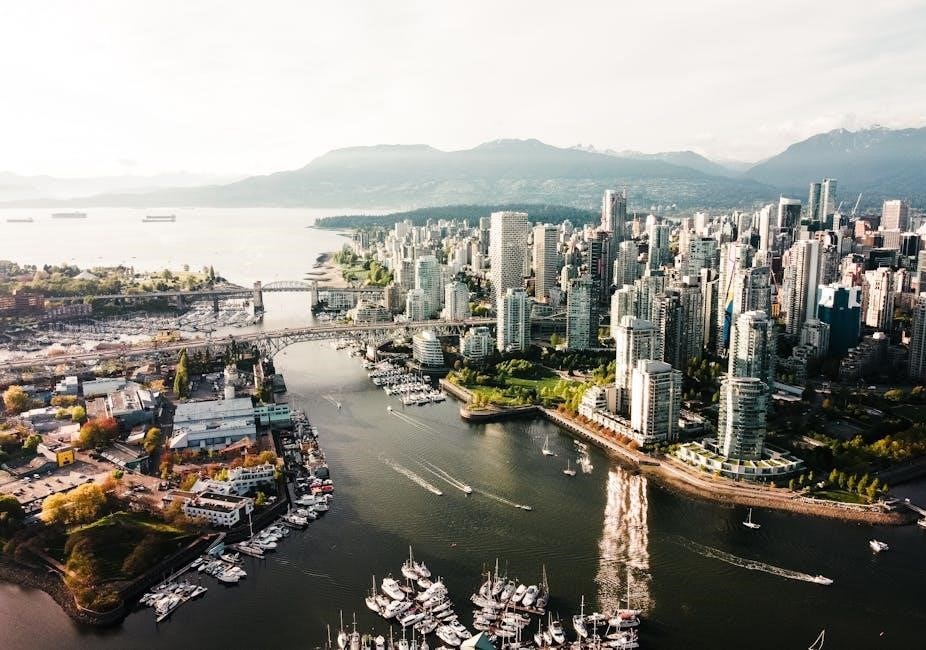standard strata bylaws bc pdf
Strata bylaws in British Columbia are governed by the Strata Property Act‚ outlining rules for shared living‚ duties of owners‚ and common property use‚ enforced by the strata council.
1.1 What Are Strata Bylaws?
Strata bylaws are rules governing shared ownership properties in British Columbia‚ created under the Strata Property Act. They regulate the use of common property‚ payment of strata fees‚ and conduct of owners‚ tenants‚ and visitors. Bylaws can be either standard‚ as outlined in the Act‚ or customized to meet specific needs. They ensure harmony and accountability within strata corporations‚ providing a framework for shared living spaces.
1.2 Importance of Strata Bylaws in BC
Strata bylaws are essential for maintaining order and accountability within shared properties in British Columbia. They ensure compliance with provincial laws‚ provide clarity on responsibilities‚ and prevent disputes. Bylaws address key aspects like fee payments‚ common property use‚ and conduct‚ creating a harmonious living environment. They also offer a legal framework for resolving conflicts and aligning with the Strata Property Act‚ ensuring fairness and consistency for all residents;

Overview of the Standard Bylaws
Standard bylaws provide a default framework for strata corporations in British Columbia‚ governing responsibilities‚ common property use‚ and dispute resolution under the Strata Property Act.
2.1 Definition of Standard Bylaws
The Standard Bylaws‚ outlined in the Strata Property Act‚ serve as default rules for strata corporations in British Columbia‚ governing responsibilities‚ common property use‚ and conduct. They apply universally unless customized‚ ensuring consistency and compliance across all strata properties in the province.
2.2 Purpose of the Standard Bylaws
The Standard Bylaws provide a framework for shared living in strata properties‚ ensuring fairness‚ order‚ and compliance with the Strata Property Act. They address responsibilities‚ payment of fees‚ common property use‚ and conduct‚ aiming to protect property values and maintain harmony among residents. These bylaws serve as a foundation for governance‚ preventing disputes and fostering a cohesive community environment within strata corporations in British Columbia.
2.3 Legal Framework Governing Standard Bylaws
The Standard Bylaws are established under Section 120 of the Strata Property Act in British Columbia‚ providing a legal foundation for strata governance. They are enforceable by law and apply to all strata corporations unless amended. The Act ensures consistency and fairness‚ with disputes resolved through the Civil Resolution Tribunal. Amendments to these bylaws require approval‚ maintaining a balance between standard rules and customized governance for individual strata corporations.

Key Sections of the Standard Bylaws
The Standard Bylaws outline essential regulations‚ including duties of owners‚ payment of strata fees‚ use of common property‚ and conduct expectations‚ ensuring harmonious community living.
3.1 Duties of Owners‚ Tenants‚ Occupants‚ and Visitors
Owners‚ tenants‚ occupants‚ and visitors must comply with bylaws‚ act reasonably‚ and avoid disturbances. Owners are responsible for maintaining their strata lot and paying fees. Tenants must follow rental terms and bylaws. Occupants and visitors must respect common property and noise regulations. Violations may result in enforcement actions under the Strata Property Act or disputes resolved by the Civil Resolution Tribunal.
3;2 Payment of Strata Fees
Owners are required to pay strata fees as set by the strata corporation. Fees cover shared expenses‚ maintenance‚ and services. Payments are due on specified dates‚ and late payments may incur penalties. Failure to pay can lead to enforcement measures‚ including legal action‚ under the Strata Property Act. Timely payment ensures the proper management and upkeep of common property and amenities for all residents.
3.3 Use of Common Property
Common property‚ such as gardens‚ parking‚ and amenities‚ is for all owners’ and residents’ use. Standard bylaws outline rules to ensure fair access and proper maintenance. Misuse‚ like unauthorized alterations or excessive noise‚ may result in enforcement action. Owners and residents must comply with strata council regulations to maintain harmony and preserve shared spaces for everyone’s benefit and enjoyment.
3.4 Conduct of Owners and Residents
Standard bylaws dictate conduct standards to maintain a peaceful living environment. Noise restrictions‚ pet rules‚ and behavior expectations are common. Owners and residents must adhere to these guidelines to avoid disputes. Non-compliance can lead to enforcement measures‚ ensuring harmony within the community. These rules are essential for fostering respect and cooperation among all strata members‚ promoting a positive living atmosphere.
Amending the Standard Bylaws
Amending standard bylaws requires a majority vote and compliance with the Strata Property Act‚ ensuring changes align with legal frameworks and address evolving community needs effectively.
4.1 Process for Amending Bylaws
The process for amending standard bylaws involves reviewing existing rules‚ proposing changes‚ and seeking approval through a majority vote at a general meeting. Amendments must comply with the Strata Property Act and be filed with the Land Title Office. Proper notice and quorum are required‚ ensuring transparency and fairness. Changes take effect once approved and communicated to all owners‚ maintaining harmony within the strata community.
4.2 Requirements for Passing Amendments
Amendments to standard bylaws require a majority vote at a general meeting‚ with proper notice provided to all owners. Significant changes may need a 3/4 vote. The strata council must ensure compliance with the Strata Property Act and document decisions accurately. Legal advice is recommended for complex amendments to avoid disputes and ensure enforceability‚ maintaining community harmony and legal integrity.
4.3 Common Reasons for Amending Standard Bylaws
Amendments to standard bylaws often address evolving community needs‚ such as regulating short-term rentals‚ noise restrictions‚ or pet policies. Changes may also align with legislative updates or tribunal rulings. Additionally‚ strata corporations may amend bylaws to clarify ambiguities‚ resolve disputes‚ or adapt to new technologies. Ensuring bylaws reflect current lifestyles and legal standards is a common motivator for making changes‚ fostering harmony and compliance within the community.

Enforcement of Strata Bylaws
Enforcement ensures compliance with community rules. The strata council and Civil Resolution Tribunal handle violations‚ with penalties for non-compliance‚ maintaining harmony and order within the strata.
5.1 Role of the Strata Council
The strata council is responsible for enforcing bylaws‚ addressing violations‚ and maintaining order within the community. They ensure rules are followed‚ mediate disputes‚ and impose penalties as needed. Their role is crucial in upholding the strata’s standards and resolving conflicts efficiently to maintain a harmonious living environment for all residents.
5.2 Dispute Resolution Mechanisms
Disputes related to strata bylaws are often resolved through mediation or the Civil Resolution Tribunal (CRT). The CRT provides a formal process for addressing bylaw violations‚ ensuring fair and timely resolutions. Strata councils may also facilitate informal discussions to resolve conflicts before escalating them to the tribunal‚ promoting community harmony and adherence to the established bylaws.
5.3 Consequences of Non-Compliance
Non-compliance with strata bylaws in British Columbia can result in fines‚ legal action‚ or tribunal rulings. Owners may face penalties‚ such as monetary fines‚ for violating rules. Repeat offenses could lead to further legal consequences‚ emphasizing the importance of adhering to established bylaws to maintain community standards and property values.

Standard Bylaws and the Strata Property Act
British Columbia’s Strata Property Act governs standard bylaws‚ ensuring consistency and fairness in strata corporations. These bylaws provide a legal framework for shared living and property management.
6.1 Overview of the Strata Property Act
The Strata Property Act governs strata housing in British Columbia‚ providing a legal framework for bylaws‚ dispute resolution‚ and management of shared properties. It ensures fairness‚ clarity‚ and consistency in strata corporations‚ addressing issues like fees‚ amendments‚ and enforcement. The Act is supported by regulations and tribunal decisions‚ making it a cornerstone for harmonious community living in BC’s strata sector.
6.2 Section 120 of the Act: Standard Bylaws
Section 120 of the Strata Property Act establishes the Standard Bylaws as the default rules for strata corporations in British Columbia. These bylaws address key matters such as owner responsibilities‚ fee payments‚ and common property use. They serve as a foundation for governance‚ ensuring consistency and fairness. Strata corporations can adopt these bylaws as-is or adapt them to suit their specific needs‚ maintaining compliance with provincial legislation.
6.3 Relationship Between Standard Bylaws and Custom Bylaws
Standard Bylaws provide a default framework‚ while custom bylaws allow strata corporations to tailor rules to their specific needs. Custom bylaws supersede Standard Bylaws but must comply with the Strata Property Act. Corporations can amend or replace Standard Bylaws entirely‚ provided the changes are approved through a formal process. This flexibility ensures governance aligns with the community’s unique requirements while maintaining legal compliance and order.
Creating Custom Strata Bylaws
Custom bylaws are tailored to meet specific strata needs‚ allowing corporations to adapt rules beyond Standard Bylaws while ensuring compliance with the Strata Property Act and legal requirements.
7.1 Why Customize Bylaws?
Customizing bylaws allows strata corporations to adapt rules to their unique needs‚ address specific concerns‚ and enhance community harmony. Standard bylaws may not cover all issues‚ such as parking‚ pets‚ or rentals. By tailoring bylaws‚ corporations can better manage shared spaces‚ reduce conflicts‚ and ensure compliance with local regulations. This customization ensures bylaws remain relevant and effective in addressing emerging challenges and the evolving needs of residents.
7.2 Steps to Develop Custom Bylaws
Developing custom bylaws involves reviewing existing rules‚ identifying unique community needs‚ and drafting new provisions. Consult legal experts to ensure compliance with the Strata Property Act. Propose changes at a general meeting‚ obtain owner approval‚ and update records. Custom bylaws must be filed with the Land Title Office and communicated to all residents to ensure clarity and enforceability.
7.3 Ensuring Compliance with the Strata Property Act
Custom bylaws must align with the Strata Property Act to remain enforceable. Legal experts should review drafts to ensure compliance. Bylaws cannot conflict with the Act or existing regulations. Approval at a general meeting and proper filing with authorities are essential. Strata councils must maintain updated records and communicate changes to residents to avoid legal disputes and ensure smooth governance.

Case Studies and Examples
A Lower Mainland strata enforced bylaws against Airbnb operations‚ highlighting the importance of adapting rules to modern challenges while adhering to the Strata Property Act.
8.1 Enforcement of Bylaws in Practice
A Lower Mainland strata successfully enforced bylaws against Airbnb operations‚ demonstrating how councils can address modern challenges. The Civil Resolution Tribunal supported the strata‚ emphasizing the importance of adhering to established rules. Enforcement ensures community standards are maintained‚ protecting property values and fostering harmony among residents. Non-compliance can lead to fines or legal action‚ reinforcing the need for clear bylaw communication and consistent enforcement practices.
8.2 Common Disputes Related to Bylaws
Disputes often arise over short-term rentals‚ like Airbnb‚ with stratas enforcing bylaws to halt such activities. Another issue is council eligibility‚ as seen when a Campbell River strata faced challenges over restrictive bylaw enforcement. These conflicts highlight the need for clear bylaw communication and consistent enforcement. Regular reviews and updates can help mitigate such issues‚ ensuring bylaws remain fair and relevant to the community’s needs and evolving lifestyles.
8.3 Successful Implementation of Custom Bylaws
Strata corporations often achieve success by tailoring bylaws to their community’s unique needs. For example‚ banning short-term rentals like Airbnb or creating pet-friendly policies. The process involves drafting‚ approval by owners‚ and clear communication. Legal compliance is crucial to avoid disputes. Regular enforcement ensures adherence‚ fostering a harmonious living environment. Updates and reviews keep bylaws relevant‚ addressing evolving challenges and enhancing community well-being effectively over time.

Role of the Civil Resolution Tribunal
The Civil Resolution Tribunal resolves strata-related disputes‚ interprets bylaws‚ and ensures compliance‚ providing a fair and efficient process for addressing conflicts within strata corporations in British Columbia.
9.1 Overview of the Tribunal’s Authority
The Civil Resolution Tribunal has authority to resolve strata-related disputes‚ enforce bylaws‚ and interpret the Strata Property Act. It addresses issues like bylaw violations‚ Airbnb operations‚ and council elections‚ ensuring fair outcomes. The tribunal’s decisions are binding and provide clarity on strata governance‚ helping to maintain harmony within strata corporations across British Columbia.
9.2 Resolving Bylaw-Related Disputes
The Civil Resolution Tribunal resolves disputes related to bylaw violations‚ ensuring compliance with the Strata Property Act. It addresses issues like unauthorized Airbnb operations and council election interference‚ providing clear rulings. The tribunal’s decisions are enforceable‚ offering a fair and efficient process to settle conflicts‚ ensuring harmony within strata communities and upholding the rules set by standard bylaws in British Columbia.
9.3 Key Decisions and Precedents
The Civil Resolution Tribunal has established key precedents in interpreting standard bylaws. Notably‚ it ruled that strata corporations must enforce bylaws consistently‚ such as stopping unauthorized Airbnb operations. Another decision clarified that bylaws preventing owners from running for council are unenforceable. These rulings guide strata corporations in interpreting standard bylaws‚ ensuring compliance with the Strata Property Act and fostering fair governance in British Columbia.
Recent Changes and Updates
Recent legislative updates to the Strata Property Act in British Columbia have streamlined bylaw enforcement and clarified rules for strata corporations‚ effective November 24‚ impacting standard bylaw applications.
10.1 Legislative Updates to the Strata Property Act
Recent legislative updates to the Strata Property Act in British Columbia‚ effective November 24‚ introduced changes to bylaw enforcement and compliance. These updates aim to clarify rules for strata corporations‚ ensuring alignment with modern housing needs. The amendments automatically override conflicting bylaws‚ reducing disputes and streamlining governance. Key changes include enhanced provisions for owner responsibility and clearer guidelines for bylaw enforcement‚ promoting fairness and transparency in strata management.
10.2 Impact of Changes on Standard Bylaws
Legislative changes to the Strata Property Act have significantly impacted standard bylaws in British Columbia. Updates automatically override conflicting bylaws‚ reducing the need for multiple agreements. This streamlines enforcement and ensures compliance with modern housing requirements. Strata corporations must now align their bylaws with the amended Act‚ addressing issues like rental restrictions and short-term rentals. These changes promote consistency and fairness‚ reducing disputes and enhancing clarity for owners and councils alike.
10.3 Future of Strata Bylaws in BC
The future of strata bylaws in British Columbia is expected to focus on modernizing regulations to address emerging issues like short-term rentals and sustainable practices. Legislative updates will likely enhance clarity and enforceability‚ ensuring bylaws align with contemporary living needs. Strata corporations may adopt more flexible‚ technology-driven approaches to governance‚ fostering better community engagement and compliance with evolving provincial standards.
Resources for Strata Corporations
Strata corporations in BC can access resources like the Strata Property Act‚ official government websites‚ and professional advisors for guidance on standard bylaws and compliance.
11.1 Accessing Standard Bylaws Documents
Standard strata bylaws documents in BC are accessible through official government websites‚ the Strata Property Act‚ and legal resources. Strata corporations can download PDF versions of the Schedule of Standard Bylaws from the BC government’s official website or through legal databases. These documents provide a template for bylaws‚ ensuring compliance with provincial legislation. They are regularly updated to reflect changes in the Strata Property Act‚ making them a reliable resource for strata governance.
11.2 Government Websites and Publications
British Columbia’s government websites provide official resources for standard strata bylaws. The Strata Property Act and its Schedule of Standard Bylaws are accessible online. Publications like the Strata Property Regulation and official forms offer detailed guidance. These resources are essential for strata corporations to understand and comply with provincial legislation‚ ensuring proper governance and dispute resolution. They are regularly updated to reflect legal changes‚ making them a reliable source for strata-related matters.
11.3 Professional Advice and Support
Consulting legal experts or property managers is crucial for interpreting and enforcing standard strata bylaws. Professional advisors provide guidance on compliance‚ amendments‚ and dispute resolution. The Civil Resolution Tribunal also offers support for strata-related disputes. Additionally‚ resources like the Strata Property Act and professional associations ensure strata corporations receive accurate and tailored advice‚ promoting effective governance and harmony within communities.
Understanding standard strata bylaws is key to maintaining order and harmony in strata communities. They provide a framework for shared living‚ ensuring compliance with the Strata Property Act.
12.1 Summary of Key Points
The Strata Property Act governs standard strata bylaws in BC‚ ensuring compliance and order in shared living spaces. Key points include duties of owners‚ payment of fees‚ common property use‚ and enforcement mechanisms. The Act also allows customization of bylaws to meet specific community needs while adhering to legal frameworks. Understanding these principles is essential for maintaining harmony and resolving disputes within strata corporations effectively.
12.2 Best Practices for Managing Strata Bylaws
Regularly review and update bylaws to ensure compliance with the Strata Property Act. Involve owners and experts to customize rules while maintaining fairness. Clearly communicate changes and ensure all residents understand their responsibilities; Document decisions and maintain accurate records. Stay informed about legal updates and seek professional advice for complex issues. Foster open communication to resolve disputes promptly and maintain a harmonious community. Consistency and transparency are key to effective bylaw management.

